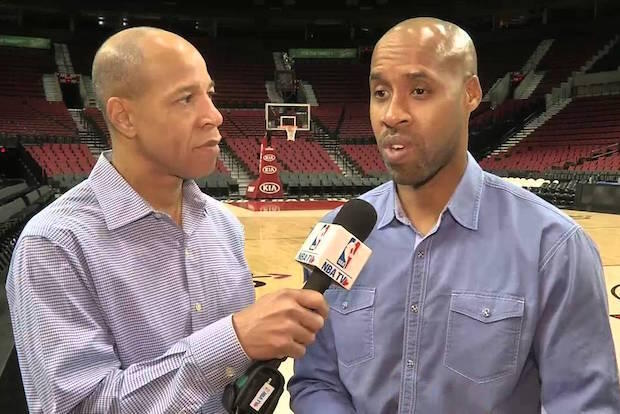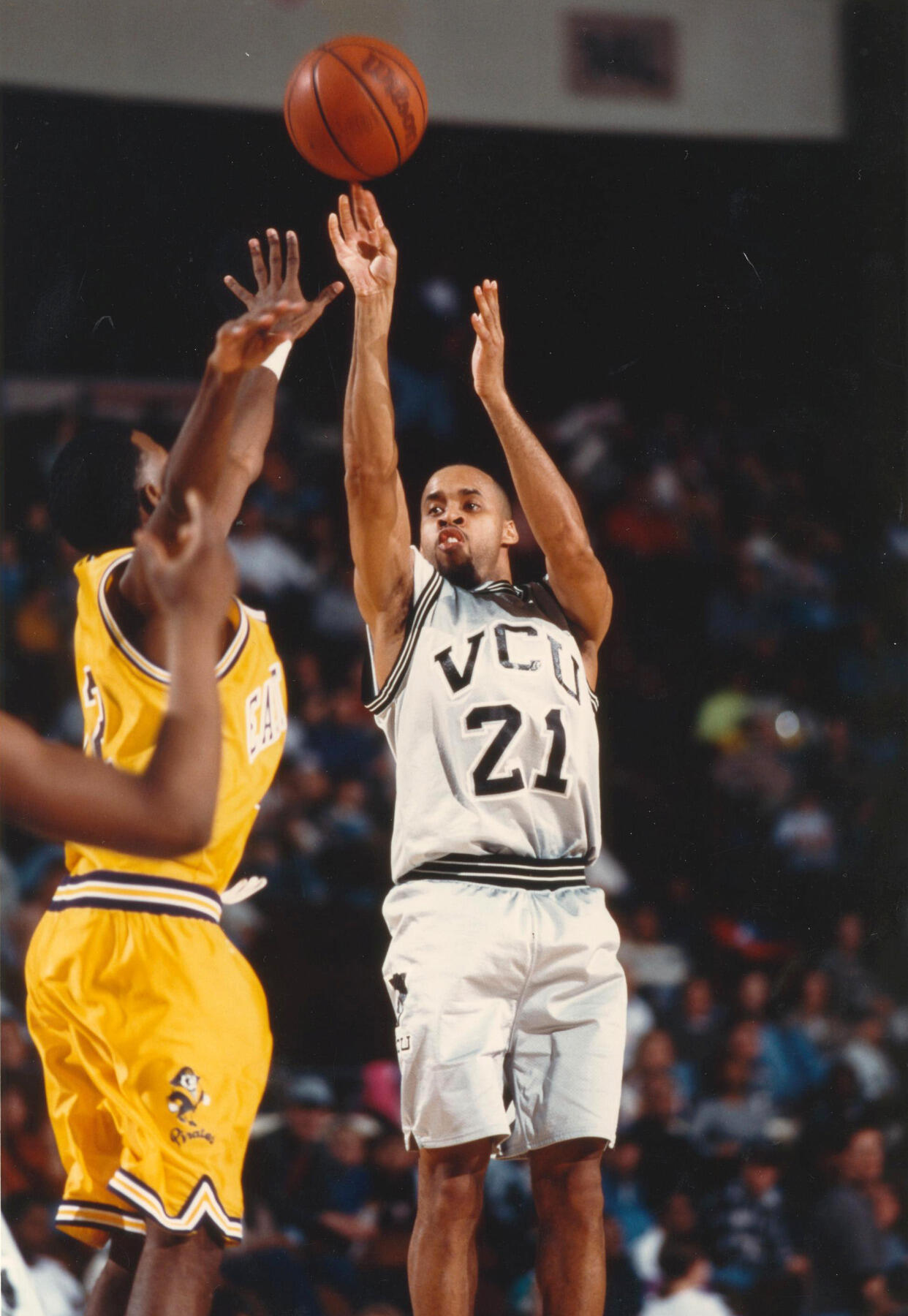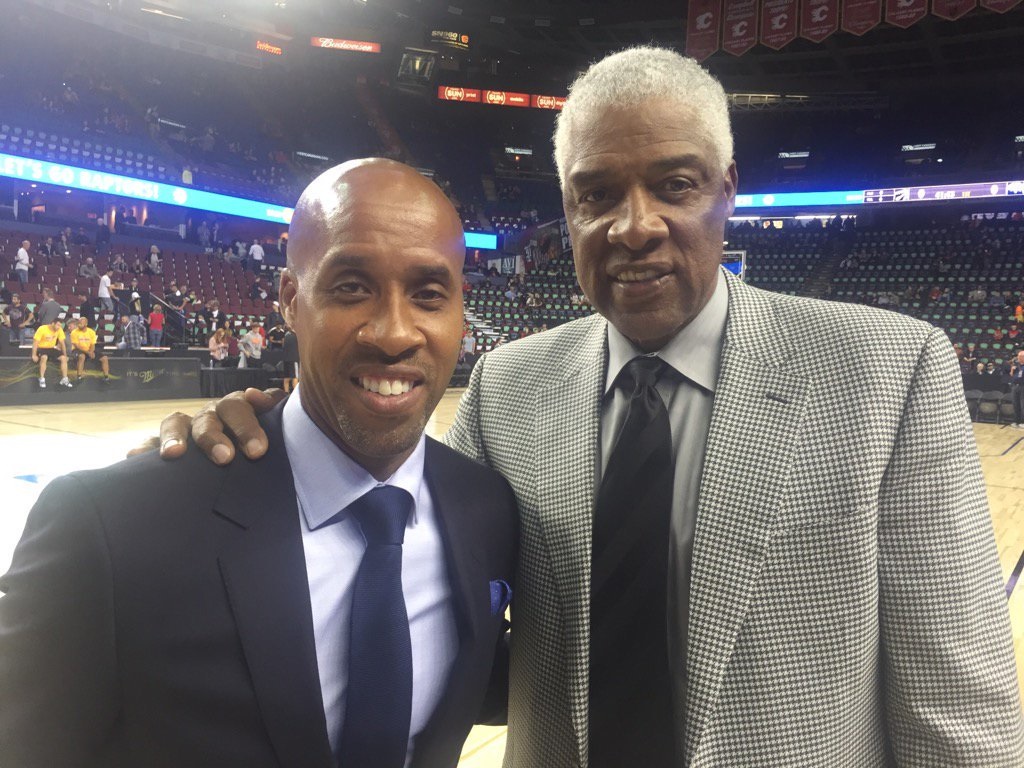
April 19, 2019
As NBA playoffs heat up, a former Rams standout is helping call the action
Share this story
Sherman Hamilton’s big break on TV started with a broken bone. Hamilton, a former star guard on the men’s basketball team at Virginia Commonwealth University, was playing in a summer league game in his native Toronto in 2003 when he broke his ankle. Hamilton had played professionally since finishing at VCU in 1997, most recently in Lithuania during the previous season for Euroleague squad BC Zalgiris. He knew the injury meant he would not be able to gain a roster spot on a pro team for the upcoming season, possibly marking the end of his professional playing career.
While rehabilitating his ankle in Toronto during the ensuing 2003-04 basketball season, he received a call to come to the TV studio at the Air Canada Centre, home of the Toronto Raptors, for an on-air interview on NBA-TV Canada. Hamilton was a well-known player in Canada, having started alongside Steve Nash in the backcourt of the country’s team in the 2000 Summer Olympics. Following that first appearance, producers asked Hamilton to keep coming back to hang out.
So Hamilton began to visit the studio when the Raptors had a game. He would sit around with the studio analysts and producers while they were off the air and watch the games with them, talking basketball throughout. One day, after about two weeks, one of the producers asked Hamilton if he’d brought a suit. Hamilton said he hadn’t. The producer told him to bring a suit for the next game. Hamilton did, and they put him in front of the studio cameras to help analyze the game.
“And I’ve been on the air now for 16 years,” Hamilton said. “It really was as simple as that. There was no magic to it. They just put me on the air, and I haven’t messed up enough yet for them to take me off.”
Hamilton appeared on the Raptors’ postgame show to start. Gradually, his role has expanded, and today he serves as a color analyst on the radio broadcast for a portion of the games and also makes pregame, postgame, quarter-break and halftime appearances on TV to comment on the action.
Hamilton said he never envisioned working as a broadcast analyst.
“This was the furthest thing from what I ever saw myself doing as a career,” he said. “That’s just the way life turns out sometimes.”
Hamilton said he’s not the only one surprised by his line of work.
“I see people who knew me when I was younger and they’re always in shock,” Hamilton said. “They always tell me, ‘You never used to say anything.’ When I was playing for the Junior Olympics team, I won the Disappearing Act award because I never said anything. Now I talk for a living.”
A ‘formative’ experience at VCU

In fact, Hamilton thought his post-playing career would fall more in line with his studies at VCU. A psychology major as an undergraduate, Hamilton had designs on pursuing a master’s degree and opening a private practice.
Hamilton remembers his time at VCU as a critical period in his development as a person and a player. He arrived as a high-flying shooting guard who liked to play fast from the wing. A back injury grounded him, but coach Sonny Smith helped him adjust, switching him to point guard and teaching him to become a craftier, more cerebral player. Hamilton said he appreciated that Smith stuck with him even though he was no longer the same player the coach had recruited.
“I got embarrassed my first year, but he coached me through all that,” Hamilton said. “He showed me how to overcome a bad break and that was a very important lesson for me. He could have pulled me, but he stuck with me and kept his eye on the big picture. I became a better player because of it.”
Glory arrived during Hamilton’s junior season when VCU won 24 games and the Colonial Athletic Association conference championship and reached the NCAA tournament. Hamilton averaged 11 points per game, second on the team, while leading the team in assists and steals.
“My years at VCU were so formative for me,” Hamilton said. “The guys I played with, the coaches, the great atmosphere on campus. There was always a closeness to the team and to the university, and the school had the diversity that I loved coming from the melting pot we’ve got in Toronto. VCU had a lot to do with me coming out of my shell and learning to be a leader.”
One advantage of Hamilton’s current gig is the travel. He visits major metros around the country. He often connects with former Rams teammates for dinner, where they catch up and reminisce about the old days.
“We’ve got lifelong connections that will always be important to me,” he said.
Finding his voice

Hamilton said he thought he was “terrible” when his broadcast career began. However, he was determined to improve and decided to approach his new pursuit the way he had chased his basketball dreams. Just as he’d spent countless hours in the gym, he now attempted to make himself a skilled broadcaster. He hung around the studio even when he wasn’t due to be on camera, haunted the editing suite and visited other shows and networks, sitting through recordings and live broadcasts to study what worked and what didn’t and why.
“I just brought the same type of intense focus to succeeding as an analyst that I’d brought to being a player,” Hamilton said.
Part of his drive stemmed from Hamilton’s desire to stay close to basketball. The injury and realization that his playing days had run out were difficult to handle, but serving as a broadcaster put him back in the arena — not on the court but near it.
Hamilton said his love of basketball has only intensified as an analyst.
“In many ways, I’ve learned more about basketball and gained a greater understanding of it, because I now see more about the management and logistics side of the sport,” Hamilton said. “I see the players from a new perspective now that I’m no longer one of them. I have to understand all levels of the sport now — it’s been like pulling back the curtain.”
Hamilton’s work as a broadcaster has coincided with Canada’s development into an emerging global basketball power. The country has produced a host of young, up-and-coming stars in recent years, and Hamilton has watched the development with pride, especially because of his involvement with the country’s entry in the 2000 Olympics.
“I feel lucky to have been on that team and to have played a role in helping to move us forward,” Hamilton said. “It means a lot.”
Now, as a commentator for the Raptors, Canada’s lone NBA franchise, Hamilton feels as though he is at the epicenter of the country’s basketball landscape. The Raptors, perennial postseason contenders, are the No. 2 seed in the Eastern Conference this year in the playoffs, and they are currently locked in battle with the Orlando Magic.
“The Raptors are the focal point right now of the love we have for basketball,” he said. “I have to be aware that I’m speaking to the whole country every game.”
Hamilton said working as an analyst carries a different thrill than being a player. It requires different skills and a different mindset, but it still fills him with excitement when the ball tips off each game.
“I just feel happy to still be a part of it,” he said.
Subscribe to VCU News
Subscribe to VCU News at newsletter.vcu.edu and receive a selection of stories, videos, photos, news clips and event listings in your inbox.







